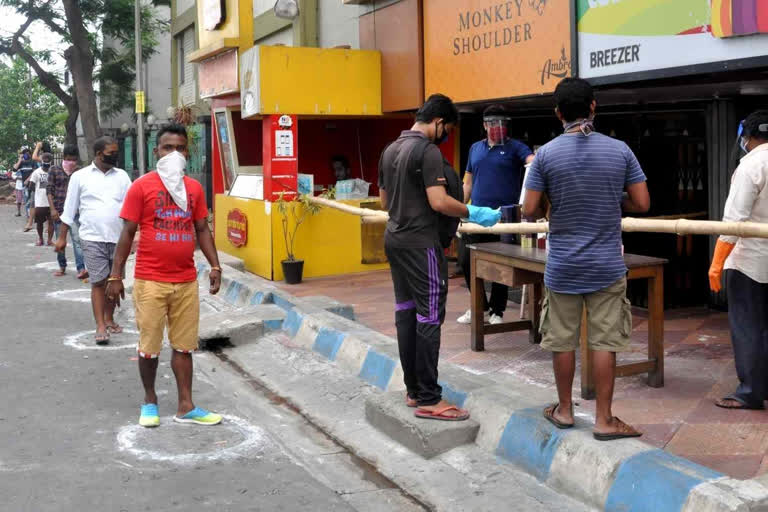New Delhi: Though the government is now easing lockdown restrictions in several places, measures like social distancing, self-isolation and home quarantine are here to stay.
With more and more businesses opening up, there is a risk of spread of infection through contact in these shops. There also have been some incidents where shopkeepers have been infected leading to further spread of the virus.
In this regard, two research associates from the Centre for Social and Behaviour Change, Ashoka University, have proposed some simple behaviourally informed steps which owners and employees of such businesses can take to provide services while protecting themselves and their customers.
Vivid, prosocial messaging on COVID-19:
Vivid messaging available outside and inside all shops can further enhance messages of the COVID-19 outbreak along with highlighting its risks. Recent evidence from research on COVID-19 depicts that prosocial and altruistic messages are most effective. The messaging can focus on everyone to follow distancing, high-grade handwashing, wearing masks, self-isolation, helpline numbers and above everything else self-report any mild symptoms to protect others in society.
Limiting Access and Longer Open Hours:
Businesses like grocery stores and supermarkets should allow only a limited number of customers on the premises with clear demarcated areas while waiting. This must be limited to as low a number as possible. Grocery stores, fruit and vegetable sellers, should also ensure there are designated areas for customers to stand and avoid crowding. One effective way is for adjusting towards longer open hours to help increase the spread of customers.
Read: COVID-19 India tracker: State-wise report
Placing Sanitizers at an Eye Level and Normalizing Use of Masks:
Businesses, like supermarkets, should have hand sanitisers placed in common spots or at an eye-level to highlight their presence. Dedicated sanitising and handwashing stations can prove to be very effective. Staff in such shops should wear masks in order to prevent others and themselves from being infected. These measures would make regular sanitising, hand-washing and mask-wearing not only salient but also behavioural barriers like optimism bias or rational ignorance due which individuals may downplay the risk of infection.
Redesigning Shopping Choice Architecture:
The route of entry, the place to stand to place order, payment portals and the exit point from the shop should all be clearly demarcated. Additionally, steps encouraging customers to place orders from a safe distance to the staff, orally or digitally can prove useful. Items should be kept accessible to staff and not in the direct reach of every customer.
Read: World will need a new template of globalisation post COVID-19: PM Modi
Maintaining Safe Distance at Check-out:
Ideally, only one customer at a time at the checkout counter can ensure a safe distance. Stores can put in billed items in shopping bags which are placed in a 'checkout tray', which remains untouched by the staff. This will reduce the chance of contact and any infection.
Transforming Kiranas to Online Pick-Up Spots:
If customers can be nudged to share their lists in advance with shopkeepers (e.g. through WhatsApp), products can be kept packed and ready for 'pick-up' by customers at a designated spot. Along with minimising contact this will also be convenient.
E-Payments over Cash:
With some reports suggesting currency acting as a place of virus transfer, e-payment methods should be encouraged, and in many places are already practised. Some shopkeepers have also outright refused to take payments in cash. Placing e-payment details at an eye-level where customers can easily scan and access the details like the QR Code will help further reduce contact.
Read: Bask in Mask: Kerala police come up with peppy campaign to spread awareness
The above are only a few measures which can aid to assist essential services to protect themselves and their customers and implement certain measures which can help reduce the spread of COVID-19. Many shopkeepers have already taken some of the above measures like drawing circles for designated standing spots and promotion of digital payments. However, with a lot of information and misinformation floating around, many small businesses may be left fending on their own. These measures will not only protect shopkeepers and customers but also make the risk of COVID-19 'real'.
(The authors, Aditya Laumas and Saksham Singh, are research associates at CSBC, Ashoka University.
Aditya is a public policy researcher and his work focuses on exploring and applying behavioural solutions to various socio-economic issues.
Saksham is a researcher in the field of behavioural development economics and public policy, with a focus on health behaviour and labour markets.)


